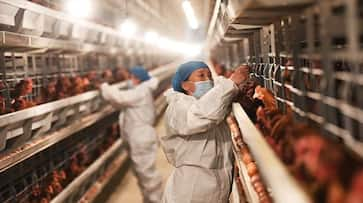'Enormous concern': WHO warns of rising threat from H5N1 avian flu transmission to humans
The World Health Organization expressed concern on Thursday over the increasing transmission of H5N1 avian flu to previously unaffected species, including humans, with a mortality rate described as "extraordinarily high."

The World Health Organization expressed concern on Thursday over the increasing transmission of H5N1 avian flu to previously unaffected species, including humans, with a mortality rate described as "extraordinarily high."
"This remains I think an enormous concern," the UN health agency's chief scientist Jeremy Farrar told reporters in Geneva.
The ongoing bird flu outbreak, which commenced in 2020, has resulted in the deaths of tens of millions of poultry, with wild birds, land mammals, and marine mammals also affected.
The recent inclusion of cows and goats in the list of affected species surprised experts, as they were not previously believed to be susceptible to this strain of influenza. The A (H5N1) strain has now evolved into what Farrar describes as "a global zoonotic animal pandemic."
"The great concern of course is that in... infecting ducks and chickens and then increasingly mammals, that virus now evolves and develops the ability to infect humans and then critically the ability to go from human to human," he said.
To date, there is no evidence of human-to-human transmission of the influenza A(H5N1) virus. However, in the instances where humans have contracted the virus through contact with infected animals, the mortality rate is alarmingly high, as Farrar emphasized.
According to the WHO, from the beginning of 2023 to April 1 of this year, there have been 889 reported human cases across 23 countries, resulting in 463 deaths, equating to a case fatality rate of 52 percent.
In a concerning development, US authorities reported earlier this month that an individual in Texas was recuperating from bird flu following exposure to dairy cattle. This marked only the second case of a human testing positive for bird flu in the country. The incident followed outbreaks of the virus in herds, which were seemingly exposed to wild birds in Texas, Kansas, and other states.
The WHO noted that this also seems to be the initial instance of a human infection with the influenza A(H5N1) virus strain through contact with an infected mammal.
When "you come into the mammalian population, then you're getting closer to humans," Farrar said, warning that "this virus is just looking for new, novel hosts".
"It's a real concern."
Farrar emphasized the need for enhanced monitoring, stressing the significance of understanding the extent of human infections, as this is where the potential adaptation of the virus is most likely to occur.
"It's a tragic thing to say, but if I get infected with H5N1 and I die, that's the end of it. If I go around the community and I spread it to somebody else then you start the cycle," he added.
Farrar highlighted ongoing efforts towards the development of vaccines and treatments for H5N1, emphasizing the importance of ensuring that regional and national health authorities worldwide have the capability to diagnose the virus. This proactive approach aims to prepare for the possibility of human-to-human transmission of H5N1.
Farrar stressed the importance of equitable access to vaccines, treatments, and diagnostics to ensure a swift and coordinated global response in the event of such transmission.
















